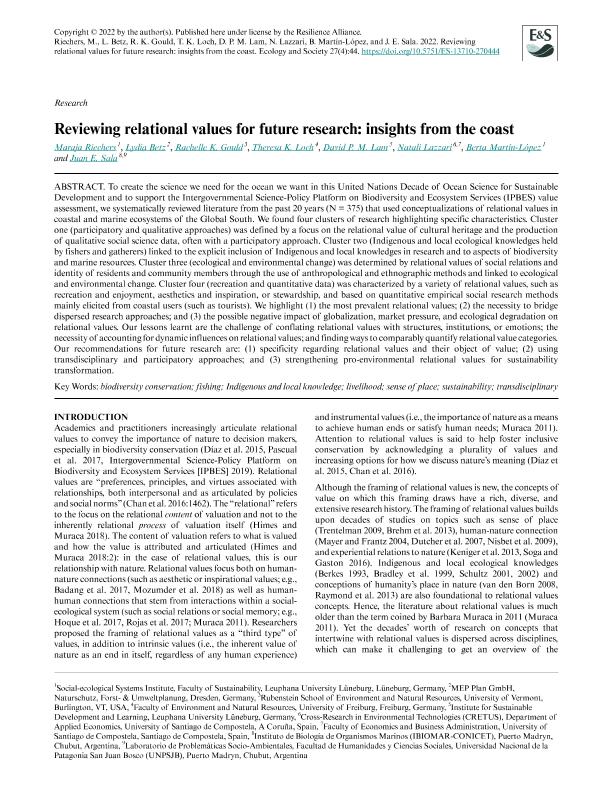Mostrar el registro sencillo del ítem
dc.contributor.author
Riechers, Maraja

dc.contributor.author
Betz, Lydia
dc.contributor.author
Gould, Rachelle

dc.contributor.author
Loch, Theresa K.
dc.contributor.author
Lam, David P. M.
dc.contributor.author
Lazzari, Natali
dc.contributor.author
Martín López, Berta

dc.contributor.author
Sala, Juan Emilio

dc.date.available
2023-07-27T14:55:00Z
dc.date.issued
2022-12
dc.identifier.citation
Riechers, Maraja; Betz, Lydia; Gould, Rachelle; Loch, Theresa K.; Lam, David P. M.; et al.; Reviewing relational values for future research: insights from the coast; Resilience Alliance; Ecology and Society; 27; 4; 12-2022; 1-18
dc.identifier.issn
1708-3087
dc.identifier.uri
http://hdl.handle.net/11336/205828
dc.description.abstract
To create the science we need for the ocean we want in this United Nations Decade of Ocean Science for Sustainable Development and to support the Intergovernmental Science-Policy Platform on Biodiversity and Ecosystem Services (IPBES) value assessment, we systematically reviewed literature from the past 20 years (N = 375) that used conceptualizations of relational values in coastal and marine ecosystems of the Global South. We found four clusters of research highlighting specific characteristics. Cluster one (participatory and qualitative approaches) was defined by a focus on the relational value of cultural heritage and the production of qualitative social science data, often with a participatory approach. Cluster two (Indigenous and local ecological knowledges held by fishers and gatherers) linked to the explicit inclusion of Indigenous and local knowledges in research and to aspects of biodiversity and marine resources. Cluster three (ecological and environmental change) was determined by relational values of social relations and identity of residents and community members through the use of anthropological and ethnographic methods and linked to ecological and environmental change. Cluster four (recreation and quantitative data) was characterized by a variety of relational values, such as recreation and enjoyment, aesthetics and inspiration, or stewardship, and based on quantitative empirical social research methods mainly elicited from coastal users (such as tourists). We highlight (1) the most prevalent relational values; (2) the necessity to bridge dispersed research approaches; and (3) the possible negative impact of globalization, market pressure, and ecological degradation on relational values. Our lessons learnt are the challenge of conflating relational values with structures, institutions, or emotions; the necessity of accounting for dynamic influences on relational values; and finding ways to comparably quantify relational value categories. Our recommendations for future research are: (1) specificity regarding relational values and their object of value; (2) using transdisciplinary and participatory approaches; and (3) strengthening pro-environmental relational values for sustainability transformation.
dc.format
application/pdf
dc.language.iso
eng
dc.publisher
Resilience Alliance

dc.rights
info:eu-repo/semantics/openAccess
dc.rights.uri
https://creativecommons.org/licenses/by/2.5/ar/
dc.subject
BIODIVERSITY CONSERVATION
dc.subject
FISHING
dc.subject
INDIGENOUS AND LOCAL KNOWLEDGE
dc.subject
LIVELIHOOD
dc.subject
SENSE OF PLACE
dc.subject
SUSTAINABILITY
dc.subject
TRANSDISCIPLINARY
dc.subject.classification
Conservación de la Biodiversidad

dc.subject.classification
Ciencias Biológicas

dc.subject.classification
CIENCIAS NATURALES Y EXACTAS

dc.title
Reviewing relational values for future research: insights from the coast
dc.type
info:eu-repo/semantics/article
dc.type
info:ar-repo/semantics/artículo
dc.type
info:eu-repo/semantics/publishedVersion
dc.date.updated
2023-07-06T11:10:32Z
dc.journal.volume
27
dc.journal.number
4
dc.journal.pagination
1-18
dc.journal.pais
Estados Unidos

dc.journal.ciudad
Dedham
dc.conicet.avisoEditorial
Online and Open Access since 1997
Ecology and Society is now licensing all its articles under the Creative Commons Attribution 4.0 International License
dc.description.fil
Fil: Riechers, Maraja. Leuphana University Lüneburg; Alemania
dc.description.fil
Fil: Betz, Lydia. Forst- & Umweltplanung; Alemania
dc.description.fil
Fil: Gould, Rachelle. University of Vermont; Estados Unidos
dc.description.fil
Fil: Loch, Theresa K.. Albert Ludwigs University of Freiburg; Alemania
dc.description.fil
Fil: Lam, David P. M.. Leuphana University Lüneburg; Alemania
dc.description.fil
Fil: Lazzari, Natali. Universidad de Santiago de Compostela; España
dc.description.fil
Fil: Martín López, Berta. Leuphana University Lüneburg; Alemania
dc.description.fil
Fil: Sala, Juan Emilio. Consejo Nacional de Investigaciones Científicas y Técnicas. Centro Científico Tecnológico Conicet - Centro Nacional Patagónico. Instituto de Biología de Organismos Marinos; Argentina. Universidad Nacional de la Patagonia "San Juan Bosco"; Argentina
dc.journal.title
Ecology and Society

dc.relation.alternativeid
info:eu-repo/semantics/altIdentifier/doi/http://dx.doi.org/10.5751/ES-13710-270444
dc.relation.alternativeid
info:eu-repo/semantics/altIdentifier/url/https://ecologyandsociety.org/vol27/iss4/art44/
Archivos asociados
